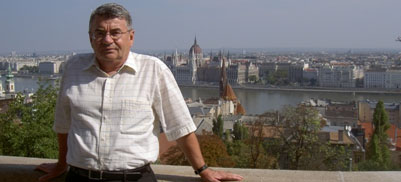1. Socio-cognitive approach to pragmatics
I have been working on a socio-cognitive approach (SCA) to pragmatics that takes into account both the societal and individual factors of communication including cooperation and egocentrism that, as I claim, are not antagonistic phenomena in interaction. SCA argues that Grice was right when he tied cooperation to the speaker-hearer’s rationality. However, egocentrism must be added to this speaker-hearer’s rationality. (Egocentrism here should not be mixed with egotistic behavior. Egocentrism is based on the prior experience of the individual, which affects the person’s actions subconsciously, almost automatically.) We, human beings are just as egocentric (as individuals) as cooperative (as social beings). In the SCA interlocutors are considered as social beings searching for meaning with individual minds embedded in a socio-cultural collectivity. SCA is considered an alternative to current theories of pragmatics that usually give an idealized account of what really happens in communication. They consider communication a cooperation-based, context-dependent, politeness-driven process in which speakers are supposed to carefully construct their utterances for the hearer taking into account all contextual factors, and hearers do their best to figure out the intentions of the speakers based on context. This approach almost completely ignores the untidy, trial-and-error nature of communication and the importance of prior contexts and experience captured in the individual use of linguistic units. SCA is presented as a theoretical framework to incorporate and reconcile two seemingly antagonistic sides of the communicative process, give equal attention to speaker production and hearer interpretation, and explain the dynamic interplay of prior and actual situational contexts in meaning production and comprehension. In this paradigm communication is characterized by the interplay of two sets of traits that are inseparable, mutually supportive, and interactive:
- Individual traits:
- - prior experience
- salience
- egocentrism - attention
- Social traits:
- - actual situational experience
- relevance
- cooperation - intention
Individual traits interact with societal traits. Each trait is the consequence of the other. Prior experience results in salience which leads to egocentrism that drives attention. Intention is a cooperation-directed practice that is governed by relevance which (partly) depends on actual situational experience. Integrating the pragmatic view of cooperation and the cognitive view of egocentrism and SCA emphasizes that both cooperation and egocentrism are manifested in all phases of communication, albeit in varying degree.
Main research issues:
- pragmatics beyond utterance;
- why do we say what we say the way we say it;
- salience-governed speaker production;
- core and emergent common ground;
2. Interculturality
The socio-cognitive approach defines interculturality (see in several publication in Kecskes 2011, 2012) as a phenomenon that is not only interactionally and socially constructed in the course of communication but also relies on relatively definable cultural models and norms that represent the speech communities to which the interlocutors belong. Consequently, interculturality has both relatively normative and emergent components. In order for us to understand the dynamism and ever-changing nature of intercultural encounters we need to approach interculturality dialectically. Cultural constructs and models change diachronically while cultural representation and speech production by individuals changes synchronically. Interculturality is a situationally emergent and co-constructed phenomenon that relies both on relatively definable cultural norms and models as well as situationally evolving features (Kecskes 2011). Intercultures are usually ad hoc creations. They are created in a communicative process in which cultural norms and models brought into the interaction from prior experience of interlocutors blend with features created ad hoc in the interaction in a synergetic way. The result is intercultural discourse in which there is mutual transformation of knowledge and communicative behavior rather than transmission. The emphasis is on transformation rather than on transmission. The research questions I have been trying to find the answer to are as follows;
- How are intercultures created in the communicative process?
- How do intercultures relate to the medium of communication?
- Linguistic features of intercultures.
3. Formulaic language in L1 and L2
I am also interested in the development and use of formulaic language. I focus on a particular type of prefabricated expressions that I call “situation-bound utterances (SBU)” which are highly conventionalized, pragmatic units whose occurrence is tied to standardized communicative situations. I focus on the following research questions:
What variables constrain the development and use of situation-bound utterances? Why, in a given situation, out of all possible SBUs that can be used, are only certain SBUs used? How do sentence-level and discourse-level creativity relate to each other in language production?
4. Second language acquisition and bi- and multilingualism
I am interested in the interaction of the linguistic and conceptual levels in language processing in dual- and multi-language systems and the effect of L2 on L1. A cognitive approach to SLA and multilingualism that takes into account both conceptual and linguistic factors rather than just focusing on the role of the linguistic systems reveals that a person who has a relatively high level of proficiency in two or more languages will not use either of the languages the way a monolingual speaker does. The “otherness” of bi- and multilinguals derives not from the linguistically-based means of their information processing systems but from the conceptually-based content of those systems. The research questions that I seek answer to can be summarized as follows:
How will the emerging new language with its own socio-cultural foundation affect the existing L1-governed knowledge and conceptual base of the language learner, and how this effect is reflected in the use of both languages?
How can an intake theory (of dual language system) explain second language acquisition and multilingual development and language use? Is it possible to develop a firm conceptual system that consists of concepts developed through two languages? Can a partly developed concept in either L1 or L2 become firmly established in the mind if the rest of the encounters with the concept occur through a language other than the primary source?
